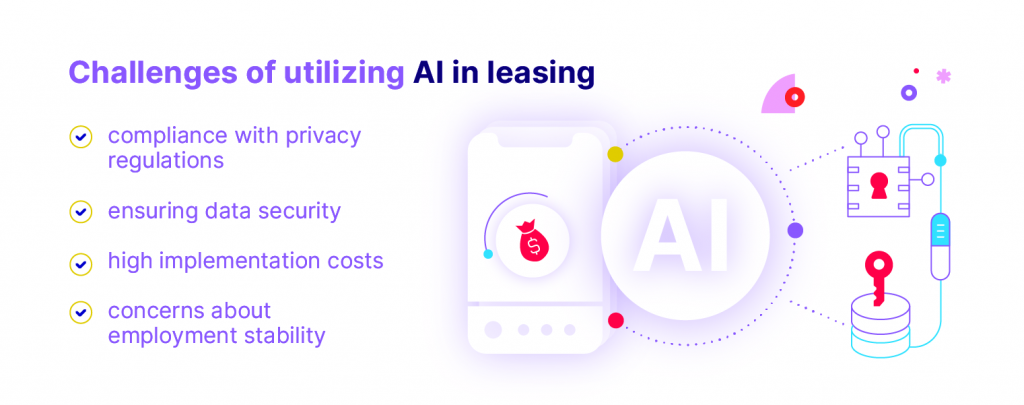How to maximise the potential of AI in leasing
- 28.06.2024
- 6 min
The transformation of the leasing industry will be driven primarily by the integration of artificial intelligence (AI). This technological shift guarantees the streamline of various aspects of leasing, from customer experience to risk management. In this article, we delve into the benefits and challenges of implementing AI in the leasing sector, focusing on the implications of the AI Act on this transition.
The role of AI in leasing
AI in leasing refers to using artificial intelligence in the sector to automate tasks, streamline processes and improve customer service. With AI leasing assistants, agents can focus on more strategic tasks, increasing efficiency and providing a more personalised experience for renters.
However, several obstacles need to be overcome before the adoption of AI leasing technology can be fully realsed. These include privacy and security concerns, seamless integration with existing systems, and managing data quality.
As companies strategise to integrate AI leasing into their operations, they must also monitor outcomes and follow necessary shifts to maintain a competitive edge in the market.
Benefits of implementing AI in the leasing sector
Let's examine some of the ways AI is helping develop advanced lease administration software.
Enhanced customer experience
AI has the potential to significantly improve customer interactions in the leasing industry. One notable application is the use of chatbots, which can handle customer inquiries efficiently and provide personalized leasing options based on customer data. This not only enhances customer satisfaction but also allows agents to focus on more complex tasks.

Automated application processing
Another key benefit of AI is the automation of application processing. AI algorithms can quickly and accurately process large volumes of leasing applications, reducing the time and effort required for manual processing. This leads to faster decision-making and improves overall operational efficiency.
Better risk management
AI is also a powerful tool for managing risk in the leasing industry. Advanced algorithms can detect and prevent fraud by analyzing patterns and anomalies in data. Additionally, AI can assess credit risk more accurately, ensuring leasing companies make informed decisions about to whom they extend credit and minimize potential losses.
Decreased operation costs
Finally, automating operations through AI leads to significant cost savings. By reducing manual intervention in routine tasks, companies can lower administrative costs and optimize resource allocation. This allows leasing companies to operate more efficiently and focus on strategic growth.
Challenges of AI in the leasing sector
Implementing AI in the leasing industry presents several challenges, ranging from technical to regulatory and ethical issues. Here are some of the main challenges.

Compliance with regulations such as the EU's AI Act
The European Union's AI Act establishes a comprehensive framework to regulate the development and use of artificial intelligence, particularly in sectors like financial services.
The Act categorises AI systems into four risk levels:
- Unacceptable risk systems (e.g., predictive policing, biometric identification) are banned.
- High-risk systems (e.g., AI-powered credit assessments) must follow strict rules on risk management, data quality, transparency, and cybersecurity and require registration with an EU database.
- Limited-risk systems (e.g., chatbots) must comply with transparency obligations like labelling AI-generated content.
- Low or minimal-risk systems are encouraged but not mandated to follow a code of conduct.
Financial institutions must interpret these guidelines carefully to remain compliant while leveraging AI technologies. Companies must develop a compliance framework, inventory and classify AI assets by risk levels, and form a cross-functional team to manage AI risk and compliance.
Ensuring data security
The integration of AI in leasing necessitates robust data security measures. Protecting sensitive customer data from breaches and unauthorised access is paramount. Companies must invest in advanced security protocols to safeguard their data and maintain customer trust.
Implementation costs
The decision to implement AI solutions should be preceded by an analysis of the needs and expectations regarding the benefits that a leasing company aims to achieve. AI technologies can be used selectively, for example, to support the automation of a part of the process so that the implementation costs will be minimal. On the other hand, a company can choose to build a competitive advantage through AI, which may require developing custom models and involve significant organizational and procedural changes, naturally leading to higher costs. Regardless of the business decision to apply AI technology, the costs to consider include the purchase or development of the technology, staff training, and the maintenance of AI systems. It is worthwhile to seek a partner who can tailor the approach to AI implementation based on the KPIs and business objectives that the leasing company aims to achieve.
Concerns about employment stability
The adoption of AI raises concerns about its impact on employment within the leasing industry. As AI automates more tasks, job displacement is potentially risky. Companies must address these concerns by reskilling employees and creating new roles that complement AI technologies.
Examples of adopting AI in leasing
Examples of artificial intelligence (AI) implementation in the banking sector, which is closely linked to the leasing industry, demonstrate the benefits that this technology can bring. Nine out of the ten largest leasing companies in Poland are part of banking groups. By leveraging the experience of their banking counterparts, leasing companies can introduce innovations that enhance operational efficiency, support decision-making processes, and improve the customer experience.
VeloBank
VeloBank has been a pioneer in AI adoption. The company has harnessed the power of AI, specifically using natural language processing and machine learning algorithms, to tackle operational challenges, such as processing customer complaints and responding to credit inquiries. Its AI-powered chatbot for credit analysts is a prime example, providing real-time answers to questions about mortgage loans, thereby boosting efficiency and accuracy. Also, VeloBank is using AI, particularly computer vision and text analytics, to verify the environmental friendliness of products by reading and analysing unstructured product descriptions.
Digitization in the leasing industry manifests itself through customer-centric actions: accelerating the financing process, improving service quality, and facilitating access to leasing funds. The main trend is automating service sales processes and customer service with self-service portals. Generative AI is beginning to play a crucial role in improving efficiency and service quality, enabling the personalization of offers, improving the accuracy of predictions, and enhancing customer service. The possibility of fully exchanging structured information about the leased item, contract, and additional services is also on the horizon. It will undoubtedly accelerate the digitization of the leasing industry in Poland.
Włodzimierz GołębiowskiDirector at EY-Parthenon
TUATARA supports the use of AI in leasing
AI is set to transform the industry by enhancing customer experience, automating processes, managing risks and reducing costs. However, the journey is challenging, particularly regarding regulatory compliance, data security, and implementation costs. By carefully navigating these challenges, leasing companies can harness the full potential of AI, driving innovation and growth in the sector.
Fintin utilises the power of AI in leasing through personalised offerings and first-class customer experience. We implement modern technologies that can define the future of the industry. Contact us for more information about our approach.
Also, learn about our experience of using innovations in the leasing industry by watching the below materials (in Polish):
- Conversational customer service. Will ChatGPT revolutionise customer communication?
- TUATARA at the e-Leasing Day 6.0 conference: personalisation and digitisation of leasing services
- #API, #AI, #SAAS #CA – Cloud solutions in the leasing sector